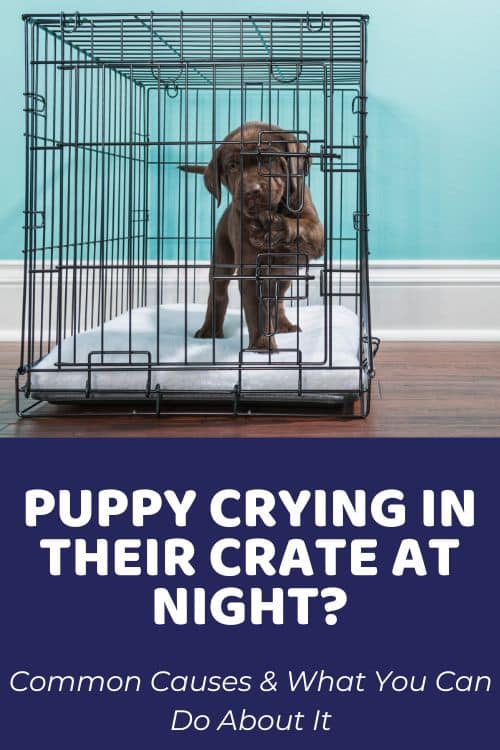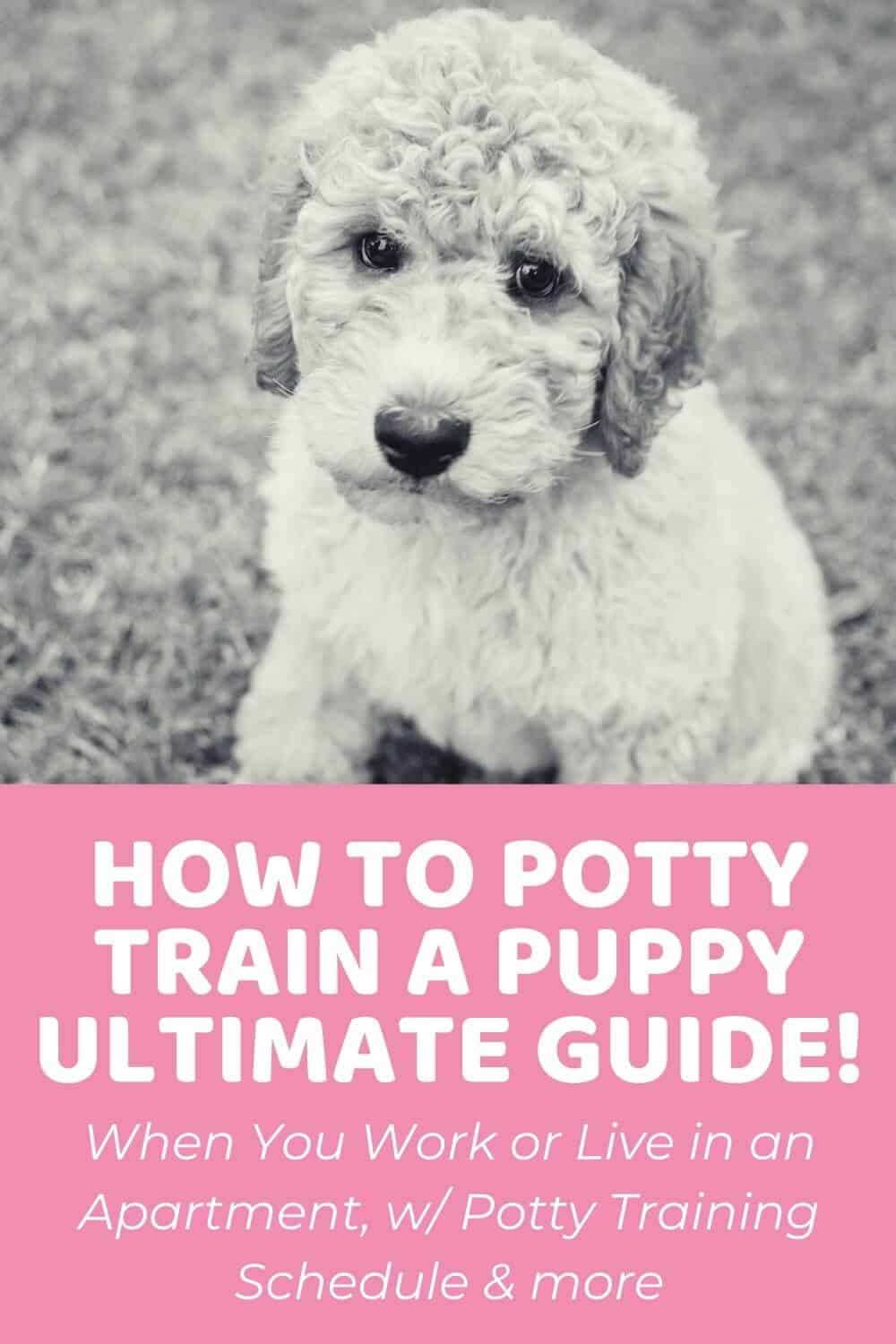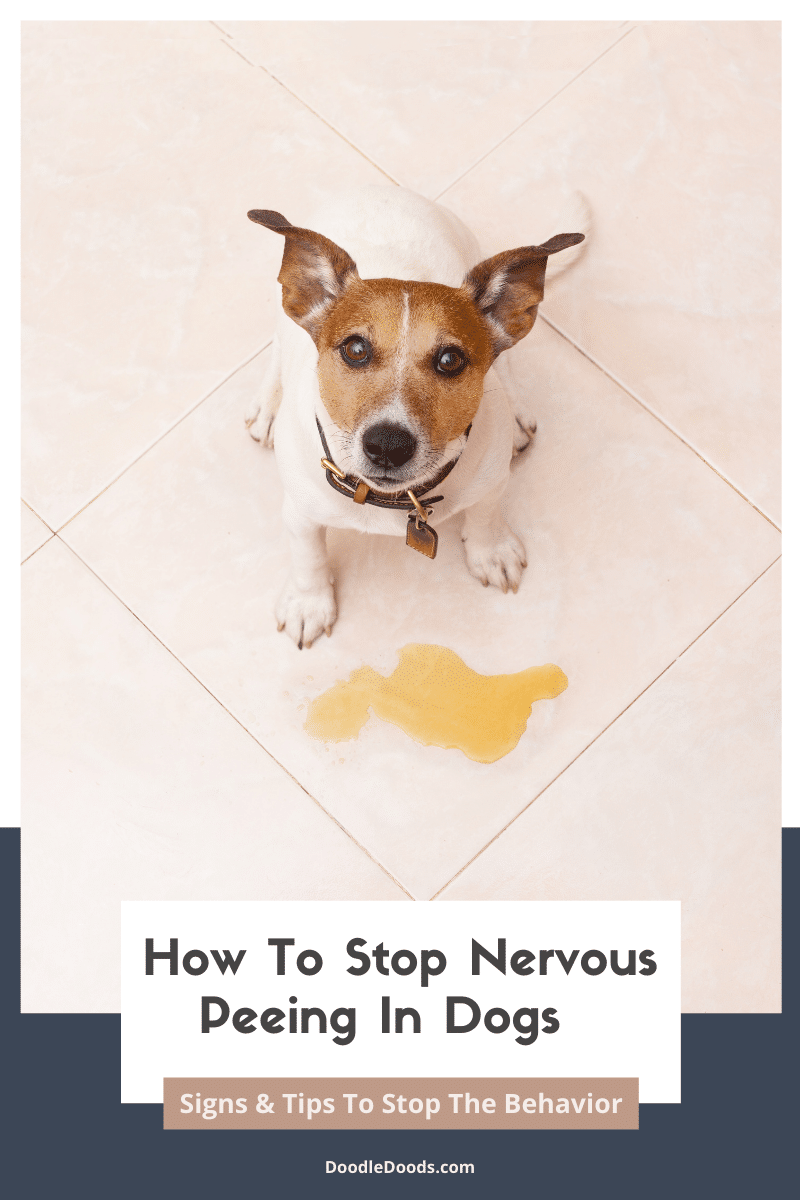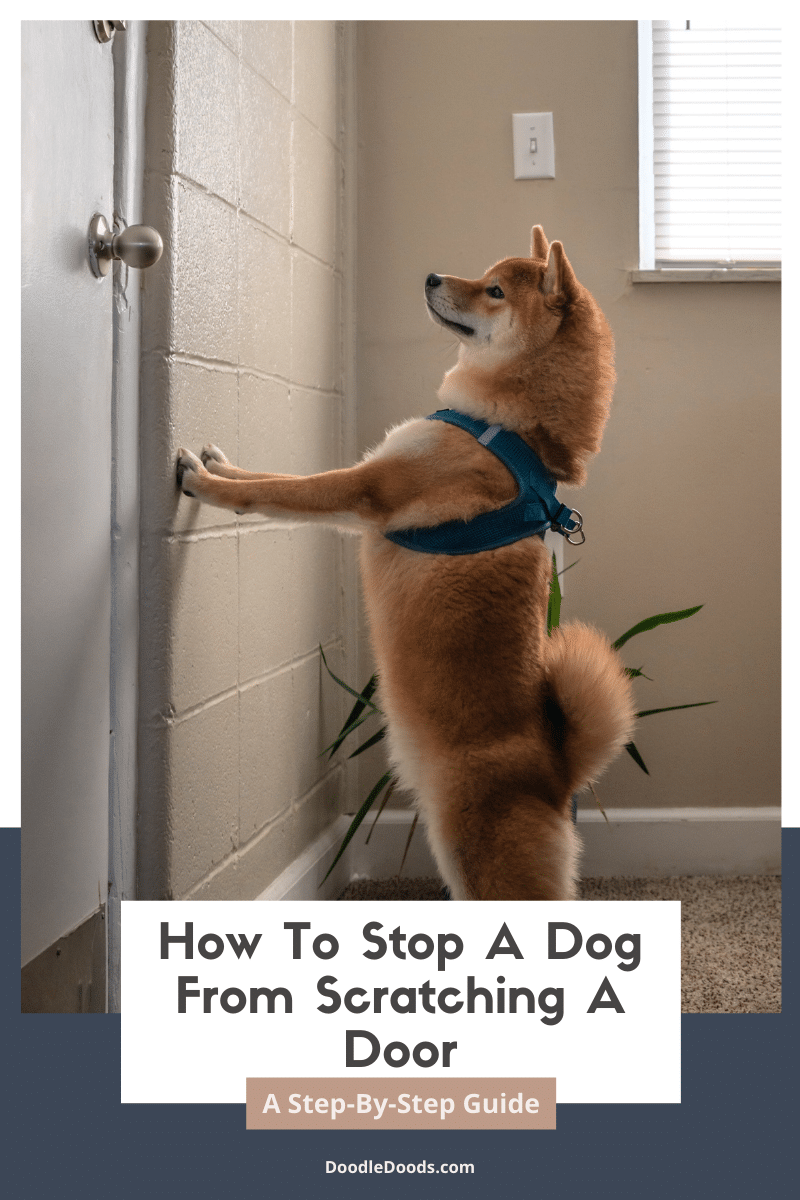Is your puppy crying in their crate at night and you have no idea how to handle the situation? In this article, we uncover why your puppy might be crying in the crate at night and what you can do about it. Keep on reading to find out more!
Table of Contents
- Why Do Puppies Cry In Their Crate?
- Is Punishing The Way To Go?
- How To Stop Your Puppy Crying In The Crate At Night
- How Long Should You Let Your Puppy Cry In The Crate?
- Why Is My Puppy Crying In Crate At Night: Frequently Asked Questions
- Why Is My Puppy Crying In Crate At Night: Final Thoughts
Why Do Puppies Cry In Their Crate?
Although we’d all prefer that our puppies would be perfectly happy in their crates, it isn’t exactly realistical at first. Not to mention, it’s absolutely heartbreaking to hear your new little family member crying and whining at night. After all, you just want them to be happy!
However, it’s completely normal for a new puppy to be crying in the crate at night. You’ve just brought them into a totally new environment, away from everything they’ve known so far – their mama, littermates, and their very first home.
Fortunately, many reputable breeders already start with crate training, which will give their puppies a great foundation. On the other hand, the process of crate training can take even up to a few weeks or months, just like any other training process. So, it’s only natural if your new puppy is crying in its crate at night.
But, there are also other reasons why your puppy may be crying in the crate at night. Here are some of the most common ones:
Your Pup Feels Stressed
It’s very common for puppies to be crying in the crate at night right after adoption, especially in the first nights after you bring them home. As we discussed earlier, it’s a huge change for your new puppy, and being in a new environment is bound to cause some confusion and excessive stress. It can even get worse once you leave the room, as there’s no one to calm their anxious mind during this stressful time.
Your Pup Feels Lonely Or Struggles With Separation Anxiety
Feeling lonely is another common reason why a puppy might be crying in their crate at night. It simply means that your puppy misses you while you’re away. This is especially common in Doodle breeds that are prone to separation anxiety.
You might want to consider the placement of the crate. Putting the crate in your bedroom is oftentimes the best way for them to feel included and close to you. Of course, you’ll also want to make sure that your pup has plenty of opportunities to socialize with you and other members of the household throughout the day.
Your Pup Is Bored
Just like we tend to get bored from time to time, so do dogs and puppies. If your puppy keeps crying in the crate at night, it might indicate that they’re simply bored or they haven’t been physically or mentally stimulated enough throughout the day. You could even place a few toys in the crate for your pup to play with.
Your Pup Is Scared
Even though you might see the crate as nothing else than what it is – a crate – your puppy may have difficulties understanding that their crate is a safe place for them to relax and recharge. Some pups are even afraid of being confined in a crate. Obviously, their fear will manifest as crying.
Additionally, a puppy will most likely start fearing the crate if you’ve used it as a form of punishment in the past. For this reason, you should never punish your puppy by confining them in a crate. To be fair, you should never punish or scold your puppy at all, regardless of the circumstances.
They Need To Go Potty
Do you know how puppies let their human parents know that they need to go potty? Well, by crying, of course! Young puppies are still learning how to control their bladder. In fact, potty training can take up to several months. So, it’s only normal that your puppy will let you know that they need to go potty during the night. Don’t worry though, they’ll soon be all house trained and the nightly crying should stop with that.
Your Puppy’s Crate Isn’t Comfy
How would you like to sit in a cage with nothing to do and no way to comfortably lie down? Well, don’t be surprised if your puppy is just being vocal about their disappointment. Make sure the crate is the correct size for your pup, and that there’s plenty of cushioning to make it comfy for them to relax in.
Is Punishing The Way To Go?
As we mentioned earlier, it’s never a good idea to punish your dog for expressing their emotions. At the end of the day, undesired behaviors are all learned, and just as easily (and sometimes not so easily) they can be unlearned. As a puppy owner, it’s your responsibility to teach your puppy good manners, and to guide them towards healthy and appropriate behaviors and reactions.
In addition to that, if your puppy is crying in the crate at night, it might very well be due to excessive stress, anxiety, fear, or other negative emotions that they struggle with. Naturally, you don’t want to make these negative emotions any worse than they already are. Instead, the right course of action would be to teach your puppy to associate the crate with something nice and pleasant.
Keep in mind that dogs and puppies are like sponges – they soak up every experience they’ve ever had and start associating them with certain places and situations, including the crate. For this reason, it’s crucial that you don’t draw any negative associations to the crate. Never use the crate as a punishment, and instead try to make it as appealing and positive as possible for your pup.
In fact, punishment is also a form of attention that your puppy will learn that they’ll get when they cry in their crate. Regardless of what you’re trying to teach your pup, it’s crucial that you use positive reinforcement training and only reward good behaviors.
How To Stop Your Puppy Crying In The Crate At Night
Even though your puppy crying in the crate at night is totally normal for the first few nights, it may become troublesome if the problem persists after a longer period of time. Fortunately, there are quite a few things you can do to stop your puppy crying in the crate at night.
Transform The Crate Into A Safe Haven
Your puppy’s crate should be their very own safe haven, where they can retreat whenever they feel like they need some alone time. You should make the crate as comfy as possible for your dog. Make sure that the crate is the right size for your pup and that there’s plenty of cushioning so that your pup feels comfortable as soon as they step into their crate. You can use dog beds, blankets, pillows – whatever makes it comfortable for your Dood.
In addition to that, you can leave some tasty treats and toys for your pup in the crate. This is a great way to entice your puppy to enjoy being inside the crate. You can even feed your puppy’s dinner inside the crate so that they’ll associate it with something nice. And we all know how much dogs love their food!
Equally important is the location of your dog’s crate. We advise you to place the crate in the area, where you or other members of the household like to spend time in. We strongly advise against placing the crate in an isolated area that’s away from the family. You can even place the crate in a specific corner or room that your puppy loves to take naps in.
Additionally, many pup owners have noted that using two crates helps their pups a great deal when crate training. You can place one crate in your living room or kitchen for the daytime, and another one in your bedroom for nightime.
Tire Out Your Pup With Exercise
If your puppy is crying in the crate at night, it might be because they simply aren’t tired enough. One of the best tricks for that is to make sure that your pup gets to exercise throughout the day. Even better, make sure you take your puppy out for a walk before bedtime to prevent those nighttime whining sessions.
Of course, you wouldn’t want to exert your pup too much, especially if they’re really young. A few minutes of playtime for very small puppies could be perfectly enough. However, if you’ve got a slightly more mature dog who is whining in the crate at night, you might have to go for a longer walk around the neighborhood to tire them out.
Moreover, mental stimulation is just as important as physical stimulation. After all, dogs are intelligent little creatures and they need to use their brains to keep them entertained and avoid boredom.
Teach Your Pup What Happens When They Cry In Crate
As we all know, puppies are fast learners. They tend to pick up new cues rather quickly. However, you can turn this into your advantage by teaching your puppy that crying in the crate at night will get them potty breaks.
If your puppy starts crying in the crate at night, simply take them out into their designated bathroom area – if they do their business, great! If they don’t, wait with them for a few minutes, take them back to the crate, and immediately go back to sleep.
This method is excellent for teaching your puppy that you won’t just ignore them when they cry in their crate at night. What’s more, you won’t have to deal with a crying and whining pup for hours on end.
If you’ve got a very young puppy, you most likely have to take them out to potty at night anyway. As they grow older, they learn to control their bladder, and they likely won’t need nighttime potty breaks once they’ve done that.
With that being said, you should always take your pup out for a bathroom break before it’s time to go to bed. This is also the key to avoiding accidents at nighttime.
Set A Routine & Stick To It
The key to any type of puppy training is consistency. We recommend you set a schedule from the moment you bring your puppy home and stick to it. Schedule mealtimes, bedtimes, nap times, playtimes, potty breaks, and anything else that would help you establish a good routine for your little pal.
Additionally, you’ll also want to be consistent with your own behavior. Choose the most suitable method to stop your puppy from crying in the crate at night, and you’ll soon notice that your puppy feels much better about their crate.
Give Them A Distraction
As we discussed earlier, a great way to prevent your puppy from crying in the crate at night is to provide them plenty of distractions once they’re in there. You can give your puppy its favorite chew toy or a snuggle toy to keep them preoccupied. You can even leave some yummy treats in the crate for your pup. This will also teach them to associate crate time with something they enjoy, since positive associations are vital here.
Ignore The Behavior
And lastly, don’t teach your puppy that crying in the crate at night will get them attention. It’s certainly heartbreaking to hear your dog crying in the crate at night. And any dog owner would want nothing else than to help their little furbaby when they’re feeling sad.
However, you don’t want to drive undesired behaviors by coddling your pup as soon as they start whining inside the crate. This will only make crate training more difficult and establish undesired behaviors in the long run.
On the other hand, you should never leave your puppy in the crate for too long. As a general rule of thumb, you should only leave your puppy in its crate in hours equal to the age in months that your pup is. For instance, if your puppy is three months old, you can leave them inside the crate for three hours at a time, tops.
How Long Should You Let Your Puppy Cry In The Crate?
For the first few nights after you bring your new puppy home, it’s completely normal for them to cry in the crate at night. However, pay attention to how often and for how long they cry. If your dog keeps persistently crying for more than 10 minutes, it’s time to consider what might be wrong.
Keep in mind that your puppy is probably more stressed than you are. If you let them cry for too long, it will only cause excessive stress and even more issues for your little Dood. The easiest way to go about this is by taking your puppy out for a potty break. It’s very likely that your baby pup actually has to go anyway.
Nonetheless, if this keeps happening even after the potty break, you should seriously think why this may be. Is the crate a comfortable place for your pup to rest in? Has your puppy exercised before bedtime? Are they bored? Do they have plenty of toys to play with and treats to munch on? Above all, you want to make the crate a positive experience for your dog.
But when do puppies stop crying at night? This usually happens in a few days’ time, provided that you’ve made the crate a nice, comfortable, and safe place for your pup to relax and recharge in.
Why Is My Puppy Crying In Crate At Night: Frequently Asked Questions
Should I Let My Puppy Cry In The Crate At Night?
Most puppies cry in the crate at night for the first few nights after you’ve brought them home. There are a few ways how you can minimize your dog whining in the crate at night. Most notably, don’t reward your puppy’s crying with attention or praise. Instead, take them out for a potty break and otherwise ignore the crying as much as possible. This will teach your puppy that crying will get them super boring potty breaks. At the same time, they’ll learn that you won’t ignore their distress.
Should You Leave Your Dog’s Crate Door Open Or Closed At Night?
We advise you to close the crate door once your puppy gets inside the crate. If after a few days your puppy has learned to calmly enjoy spending time in the crate at nighttime, you can start leaving the crate door open during the daytime.
How Do I Get My Dog To Sleep In His Crate?
Make the crate a comfy place for your pup to rest and sleep in. Make sure it has plenty of cushioning, and also some chew toys and dog treats. This will teach your puppy to associate the crate with positive experiences. In addition to that, we recommend you place the nighttime crate in your bedroom so your puppy doesn’t feel too lonely.
Why Is My Puppy Crying In Crate At Night: Final Thoughts
It’s not uncommon for puppies to be crying in their crates at night, especially if they’ve just moved into a new household with all of its new family members. Luckily, there are many simple techniques that will help your puppy get used to sleeping inside the crate at night. Hopefully you learned some useful tips and tricks from this guide. We also recommend you check out our full guide on How To Crate Train A Puppy with tons of helpful methods, along with a puppy crate training schedule.
Learn How to Care for Your Doodle Puppy!

Perfect for first-time Doodle parents, get ALL your questions answered, including questions new Doodle parents don’t even think to ask.
Plus, get $700 worth of Bonus Materials for FREE, including:- Doodle Parenthood Community and Support Group ($190 value)
- Doodle Puppy Growth Tracker ($20 value)
- EMERGENCY Cheatsheet: When To Call The Vet Immediately ($50 value)
- HELP! Button ($145 value)
- And SO MUCH MORE!











